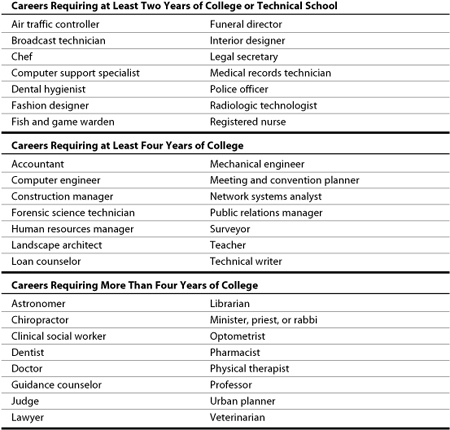College isn’t just about studying
specific subjects. In college you also learn more about yourself and
what interests you. And you learn what doors of opportunity are waiting
to be opened by someone just like you.
What If I Don’t Know What I Want to Do?
If you’re not sure about what you want to do
or what opportunities are available to you, you’re not alone. Most kids
aren’t sure. That includes college kids, too. Learning about your
career opportunities is one important way that college can be helpful
to you.
You don’t have to know exactly what you want
to be right now. It’s more important for you to understand some basic
things about careers. Some careers require a college education, but
others do not. If you want to be an architect, you must
complete college. Running your own business may not require you to have
a college education, but the college courses you take can improve your
chances of success.
For many careers, college is just the
beginning. For example, to be a lawyer, you must first go to college
and then to law school. To be a doctor, you have to go to medical
school after college.
You can enter other careers with different
levels of education. And various jobs within career fields may require
different amounts of education. For example, to be a school teacher,
you must be a college graduate. Most school teachers continue their
studies after college. To be a principal or a college professor,
however, you must have advanced studies beyond college. The following
chart gives more examples of careers and the education you need to
prepare for them.
Careers and College Education

The amount of education
you need is not the only thing that differs from one career to another.
Some careers, such as those in business and engineering, require
specific skills. You will also need to take specific courses to develop
these skills.
Other careers have less specific
requirements. You can enter them with a broader range of courses and
skills. For example, if you go into sales, you might have a background
in business, economics, liberal arts, or communications. If you want a
career in a helping profession such as social work, you could have a
background in education, medicine, or social sciences.
Learning what people in a career really do, and what education and skills they need, is important for planning your future.